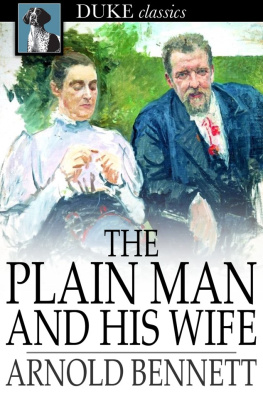Arnold Bennett - A Bracelet at Bruges
Here you can read online Arnold Bennett - A Bracelet at Bruges full text of the book (entire story) in english for free. Download pdf and epub, get meaning, cover and reviews about this ebook. year: 0101, genre: Detective and thriller. Description of the work, (preface) as well as reviews are available. Best literature library LitArk.com created for fans of good reading and offers a wide selection of genres:
Romance novel
Science fiction
Adventure
Detective
Science
History
Home and family
Prose
Art
Politics
Computer
Non-fiction
Religion
Business
Children
Humor
Choose a favorite category and find really read worthwhile books. Enjoy immersion in the world of imagination, feel the emotions of the characters or learn something new for yourself, make an fascinating discovery.

- Book:A Bracelet at Bruges
- Author:
- Genre:
- Year:0101
- Rating:3 / 5
- Favourites:Add to favourites
- Your mark:
- 60
- 1
- 2
- 3
- 4
- 5
A Bracelet at Bruges: summary, description and annotation
We offer to read an annotation, description, summary or preface (depends on what the author of the book "A Bracelet at Bruges" wrote himself). If you haven't found the necessary information about the book — write in the comments, we will try to find it.
A Bracelet at Bruges — read online for free the complete book (whole text) full work
Below is the text of the book, divided by pages. System saving the place of the last page read, allows you to conveniently read the book "A Bracelet at Bruges" online for free, without having to search again every time where you left off. Put a bookmark, and you can go to the page where you finished reading at any time.
Font size:
Interval:
Bookmark:
A Bracelet at Bruges by ARNOLD BENNETT
I.
THE bracelet had fallen into the canal.
And the fact that the canal was the most picturesque canal in the old Flemish city of Bruges, and that the ripples caused by the splash of the bracelet had disturbed reflections of wondrous belfries, towers, steeples, and other unique examples of Gothic architecture, did nothing whatever to assuage the sudden agony of that disappearance. For the bracelet had been given to Kitty Sartorius by her grateful and lordly manager, Lionel Belmont (U.S.A.), upon the completion of the unexampled run of "The Delmonico Doll," at the Regency Theatre, London. And its diamonds were worth five hundred pounds, to say nothing of the gold.
The beautiful Kitty, and her friend Eve Fincastle, the journalist, having exhausted Ostend, had duly arrived at Bruges in the course of their holiday tour. The question of Kitty's jewellery had arisen at the start. Kitty had insisted that she must travel with all her jewels, according to the custom of theatrical stars of great magnitude. Eve had equally insisted that Kitty must travel without jewels, and had exhorted her to remember the days of her simplicity. They compromised. Kitty was allowed to bring the bracelet, but nothing else gave the usual half-dozen rings. The ravishing creature could not have persuaded herself to leave the bracelet behind, because it was so recent a gift and still new and strange and heavenly to her. But, since prudence forbade even Kitty to let the trifle lie about in hotel bedrooms, she was obliged always to wear it. And she had been wearing it this bright afternoon in early October, when the girls, during a stroll, had met one of their new friends, Madame Lawrence, on the world-famous Quai du Rosaire, just at the back of the Hotel de Ville and the Halles.
Madame Lawrence resided permanently in Bruges. She was between twenty-five and forty-five, dark, with the air of continually subduing a natural instinct to dash, and well dressed in black. Equally interested in the peerage and in the poor, she had made the acquaintance of Eve and Kitty at the Htel de la Grande Place, where she called from time to time to induce English travellers to buy genuine Bruges lace, wrought under her own supervision by her own paupers. She was Belgian by birth, and when complimented on her fluent and correct English, she gave all the praise to her deceased husband, an English barrister. She had settled in Bruges like many people settle there, because Bruges is inexpensive, picturesque, and inordinately respectable. Besides an English church and chaplain, it has two cathedrals and an episcopal palace, with a real bishop in it.
"What an exquisite bracelet! May I look at it?" It was these simple but ecstatic words, spoken with Madame Lawrence charming foreign accent, which had begun the tragedy. The three women had stopped to admire the always admirable view from the little quay, and they were leaning over the rails when Kitty unclasped the bracelet for the inspection of the widow. The next instant there was a plop, an affrighted exclamation from Madame Lawrence in her native tongue, and the bracelet was engulfed before the very eyes of all three.
The three looked at each other non-plussed. Then they looked around, but not a single person was in sight. Then, for some reason which, doubtless, psychology can explain, they stared hard at the water, though the water there was just as black and foul as it is everywhere else in the canal system of Bruges.
"Surely you've not dropped it!" Eve Fincastle exclaimed in a voice of horror. Yet she knew positively that Madame Lawrence had.
The delinquent took a handkerchief from her muff and sobbed into it. And between her sobs she murmured: "We must inform the police."
"Yes, of course," said Kitty, with the lightness of one to whom a five-hundred-pound bracelet is a bagatelle. "They'll fish it up in no time."
"Well," Eve decided, "you go to the police at once, Kitty; and Madame Lawrence will go with you, because she speaks French, and I'll stay here to mark the exact spot."
The other two started, but Madame Lawrence, after a few steps, put her hand to her side. "I can't," she sighed, pale. "I am too upset. I cannot walk. You go with Miss Sartorius," she said to Eve, "and I will stay," and she leaned heavily against the railings.
Eve and Kitty ran off, just as if it was an affair of seconds, and the bracelet had to be saved from drowning. But they had scarcely turned the corner, thirty yards away, when they reappeared in company with a high official of police, whom, by the most lucky chance in the world, they had encountered in the covered passage leading to the Place du Bourg. This official, instantly enslaved by Kitty's beauty, proved to be the very mirror of politeness and optimism. He took their names and addresses, and a full description of the bracelet, and informed them that at that place the canal was nine feet deep. He said that the bracelet should undoubtedly be recovered on the morrow, but that, as dusk was imminent, it would be futile to commence angling that night. In the meantime the loss should be kept secret; and to make all sure, a succession of gendarmes should guard the spot during the night.
Kitty grew radiant, and rewarded the gallant officer with smiles; Eve was satisfied, and the face of Madame Lawrence wore a less mournful hue.
"And now," said Kitty to Madame, when everything had been arranged, and the first of the gendarmes was duly installed at the exact spot against the railings, "you must come and take tea with us in our winter garden; and be gay! Smile: I insist. And I insist that you don't worry."
Madame Lawrence tried feebly to smile.
"You are very good-natured," she stammered.
Which was decidedly true.
II.
The winter-garden of the Htel de la Grande Place, referred to in all the hotel's advertisements, was merely the inner court of the hotel, roofed in by glass at the height of the first storey. Cane flourished there, in the shape of lounge-chairs, but no other plant. One of the lounge chairs was occupied when, just as the carillon in the belfry at the other end of the Place began to play Gounod's "Nazareth," indicating the hour of five o'clock, the three ladies entered the winter-garden. Apparently the toilettes of two of them had been adjusted and embellished as for a somewhat ceremonious occasion.
"Lo!" cried Kitty Sartorius, when she perceived the occupant of the chair, "the millionaire! Mr. Thorold, how charming of you to reappear like this! I invite you to tea."
Cecil Thorold rose with appropriate eagerness.
"Delighted!" he said, smiling, and then explained that he had arrived from Ostend about two hours before and had taken rooms in the hotel.
"You knew we were staying here?" Eve asked as he shook hands with her.
"No," he replied; "but I am very glad to find you again."
"Are you?" She spoke languidly, but her colour heightened and those eyes of hers sparkled.
"Madame Lawrence," Kitty chirruped, "let me present Mr. Cecil Thorold. He is appallingly rich, but we mustn't let that frighten us."
From a mouth less adorable than the mouth of Miss Sartorius such an introduction might have been judged lacking in the elements of good form, but for more than two years now Kitty had known that whatever she did or said was perfectly correct because she did or said it. The new acquaintances laughed amiably and a certain intimacy was at once established.
"Shall I order tea, dear?" Eve suggested.
"No, dear," said Kitty quietly. "We will wait for the Count."
"The Count?" demanded Cecil Thorold.
"The Comte d'Avrec," Kitty explained. "He is staying here."
"A French nobleman, doubtless?"
"Yes," said Kitty; and she added, "you will like him. He is an archologist, and a musician oh, and lots of things!"
Next pageFont size:
Interval:
Bookmark:
Similar books «A Bracelet at Bruges»
Look at similar books to A Bracelet at Bruges. We have selected literature similar in name and meaning in the hope of providing readers with more options to find new, interesting, not yet read works.
Discussion, reviews of the book A Bracelet at Bruges and just readers' own opinions. Leave your comments, write what you think about the work, its meaning or the main characters. Specify what exactly you liked and what you didn't like, and why you think so.





